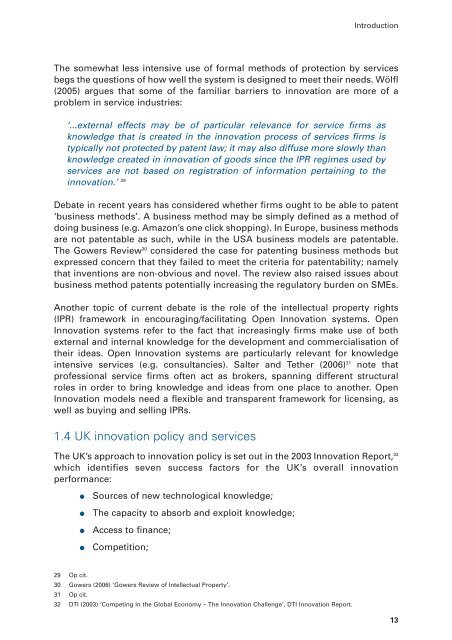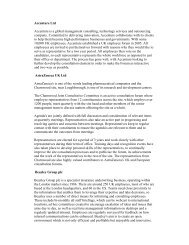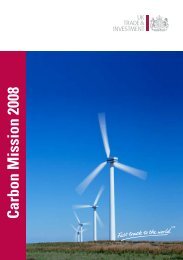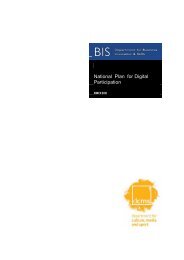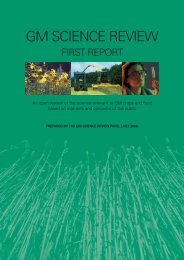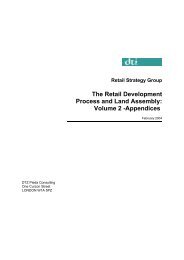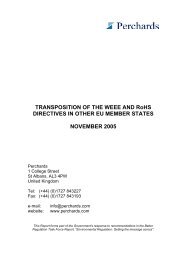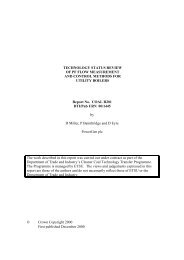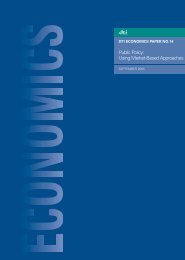Innovation in Services - Department for Business, Innovation and Skills
Innovation in Services - Department for Business, Innovation and Skills
Innovation in Services - Department for Business, Innovation and Skills
Create successful ePaper yourself
Turn your PDF publications into a flip-book with our unique Google optimized e-Paper software.
The somewhat less <strong>in</strong>tensive use of <strong>for</strong>mal methods of protection by services<br />
begs the questions of how well the system is designed to meet their needs. Wölfl<br />
(2005) argues that some of the familiar barriers to <strong>in</strong>novation are more of a<br />
problem <strong>in</strong> service <strong>in</strong>dustries:<br />
‘...external effects may be of particular relevance <strong>for</strong> service firms as<br />
knowledge that is created <strong>in</strong> the <strong>in</strong>novation process of services firms is<br />
typically not protected by patent law; it may also diffuse more slowly than<br />
knowledge created <strong>in</strong> <strong>in</strong>novation of goods s<strong>in</strong>ce the IPR regimes used by<br />
services are not based on registration of <strong>in</strong><strong>for</strong>mation perta<strong>in</strong><strong>in</strong>g to the<br />
<strong>in</strong>novation.’ 29<br />
Debate <strong>in</strong> recent years has considered whether firms ought to be able to patent<br />
‘bus<strong>in</strong>ess methods’. A bus<strong>in</strong>ess method may be simply def<strong>in</strong>ed as a method of<br />
do<strong>in</strong>g bus<strong>in</strong>ess (e.g. Amazon’s one click shopp<strong>in</strong>g). In Europe, bus<strong>in</strong>ess methods<br />
are not patentable as such, while <strong>in</strong> the USA bus<strong>in</strong>ess models are patentable.<br />
The Gowers Review 30 considered the case <strong>for</strong> patent<strong>in</strong>g bus<strong>in</strong>ess methods but<br />
expressed concern that they failed to meet the criteria <strong>for</strong> patentability; namely<br />
that <strong>in</strong>ventions are non-obvious <strong>and</strong> novel. The review also raised issues about<br />
bus<strong>in</strong>ess method patents potentially <strong>in</strong>creas<strong>in</strong>g the regulatory burden on SMEs.<br />
Another topic of current debate is the role of the <strong>in</strong>tellectual property rights<br />
(IPR) framework <strong>in</strong> encourag<strong>in</strong>g/facilitat<strong>in</strong>g Open <strong>Innovation</strong> systems. Open<br />
<strong>Innovation</strong> systems refer to the fact that <strong>in</strong>creas<strong>in</strong>gly firms make use of both<br />
external <strong>and</strong> <strong>in</strong>ternal knowledge <strong>for</strong> the development <strong>and</strong> commercialisation of<br />
their ideas. Open <strong>Innovation</strong> systems are particularly relevant <strong>for</strong> knowledge<br />
<strong>in</strong>tensive services (e.g. consultancies). Salter <strong>and</strong> Tether (2006) 31 note that<br />
professional service firms often act as brokers, spann<strong>in</strong>g different structural<br />
roles <strong>in</strong> order to br<strong>in</strong>g knowledge <strong>and</strong> ideas from one place to another. Open<br />
<strong>Innovation</strong> models need a flexible <strong>and</strong> transparent framework <strong>for</strong> licens<strong>in</strong>g, as<br />
well as buy<strong>in</strong>g <strong>and</strong> sell<strong>in</strong>g IPRs.<br />
1.4 UK <strong>in</strong>novation policy <strong>and</strong> services<br />
The UK’s approach to <strong>in</strong>novation policy is set out <strong>in</strong> the 2003 <strong>Innovation</strong> Report, 32<br />
which identifies seven success factors <strong>for</strong> the UK’s overall <strong>in</strong>novation<br />
per<strong>for</strong>mance:<br />
● Sources of new technological knowledge;<br />
● The capacity to absorb <strong>and</strong> exploit knowledge;<br />
● Access to f<strong>in</strong>ance;<br />
● Competition;<br />
29 Op cit.<br />
30 Gowers (2006) ‘Gowers Review of Intellectual Property’.<br />
31 Op cit.<br />
32 DTI (2003) ‘Compet<strong>in</strong>g <strong>in</strong> the Global Economy – The <strong>Innovation</strong> Challenge’, DTI <strong>Innovation</strong> Report.<br />
Introduction<br />
13


